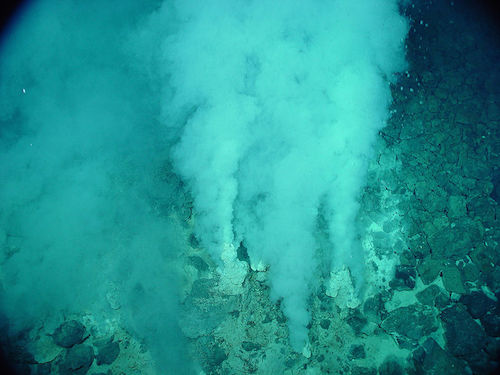 Intelligent Design
Intelligent Design
 Life Sciences
Life Sciences
First Steps Are Toughest? Not When It Comes to the Origin of Life

The first step is always the hardest, and therefore in a sense the most important in getting where you want to go. It’s a popular notion that holds true in many contexts — for example, just picking up the phone to make a call you’re nervous about, yes that can be difficult. But it’s a different matter when it comes to the mystery of the origin of life.
Obtaining “building blocks” of life through an unguided natural process is one thing. Putting them together the right way, composing biological information, is something else altogether.
Yet research purporting to clear the way to a solution of the OOL problem by way of an easy first step continues to appear. Now this: Scientists at University College London found that hydrothermal vents on the seabed produce enzyme-like organic molecules. A first step! From the Science Daily article:
Hot vents on the seabed could have spontaneously produced the organic molecules necessary for life, according to new research by UCL chemists. The study shows how the surfaces of mineral particles inside hydrothermal vents have similar chemical properties to enzymes, the biological molecules that govern chemical reactions in living organisms. This means that vents are able to create simple carbon-based molecules, such as methanol and formic acid, out of the dissolved CO2 in the water.
The discovery, published in the journal Chemical Communications, explains how some of the key building blocks for organic chemistry were already being formed in nature before life emerged — and may have played a role in the emergence of the first life forms. It also has potential practical applications, showing how products such as plastics and fuels could be synthesised from CO2 rather than oil.
“There is a lot of speculation that hydrothermal vents could be the location where life on Earth began,” says Nora de Leeuw, who heads the team. “There is a lot of CO2 dissolved in the water, which could provide the carbon that the chemistry of living organisms is based on, and there is plenty of energy, because the water is hot and turbulent. What our research proves is that these vents also have the chemical properties that encourage these molecules to recombine into molecules usually associated with living organisms.”
Pop science media eat this stuff up. From the Daily Mail article, “Did life begin in underwater volcanoes? Hot sea vents spontaneously produce building blocks needed for organisms to develop“:
Scientists have long pondered whether hot vents on the seabed could have been where life on Earth began.
And now chemists in London have discovered that such vents emit geothermally heated water that does create the kind of environment needed to produce organic molecules necessary for life….
Hydrothermal vents are fissures in the Earth’s surface from which hot water erupts.
They are not the same as underwater volcanoes, but are found near volcanically active places and areas where tectonic plates are moving apart.
Chemists from University College London (UCL) discovered that the surfaces of mineral particles inside hydrothermal vents have similar chemical properties to enzymes, which are the biological molecules that control chemical reactions in living organisms.
Here’s the problem, though. It’s like making Lego blocks and then expecting them to assemble themselves into a massive structure that is not only complex but also alive.
Or no, a better analogy would be it’s like finding rocks on the beach that resemble Lego blocks, then expecting the wind and waves to fashion them into a massive structure that is not only full of information but also alive.
See Stephen Meyer’s book Signature in the Cell: DNA and the Evidence for Intelligent Design. The theory of first steps may be true of quitting cigarettes or going on a diet. With generating life from non-life? Not so much.
Image by NOAA [Public domain], via Wikimedia Commons.
